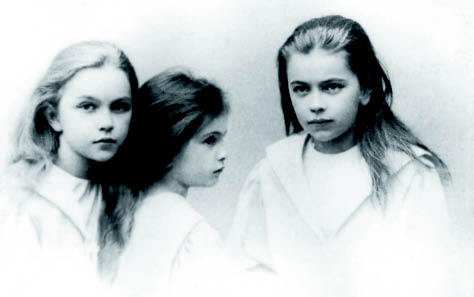These two memoirs by ladies born into the Russian elite in the 1880s have both had to wait many decades before publication in English. The Green Snake, however, has gone through eight editions in its original German, whereas The Russian Countess has never been published before. No one was in the least interested in a Russia that no longer existed.
Margarita Woloschin was a painter and her husband was a well-known poet. She knew most of the key figures in the Russian Symbolist movement, and she became a disciple of Rudolf Steiner, the founder of anthroposophy. From 1924 to her death in 1973 she lived in Stuttgart and devoted herself to her art and her work as a teacher of Steiner’s doctrines. It is probably her connection with Steiner, someone better known in Germany than in England, that has kept the German version of The Green Snake in print.
Unfortunately, this memoir has the oddly abstract quality of Rudolf Steiner’s own writings. Woloschin meets interesting figures but is unable to bring them to life on the page. Nor can she explain what is important about anthroposophy. As if to compensate, she rhapsodises a great deal about ‘the Russian folk-soul’.
Nevertheless, Russia immediately before and after the Revolution was so extraordinary a place that few memoirs of the period are entirely without interest. An account of an anti-religious rally in 1918 is particularly striking. The chairman innocently grants a village priest’s request to say ‘only three words’:
The priest climbed up to the podium … and called out in a loud voice, ‘Christ is arisen!’ And as if with one voice came the response, ‘Truly, He is arisen!’ The old man was immediately arrested.
Both the priest’s words and the response are fixed idioms; even if their revolutionary enthusiasm was genuine, the crowd was unable to resist the pull of the hallowed words.
Woloschin also describes a meeting with Tolstoy. She is dismayed by the contrast between ‘the power of truth which worked in him’ and his ‘foolish’ advice that she give up painting and live as a peasant. As she leaves, Tolstoy’s wife confides:
He is becoming so weak … I try to feed him well, and have everything cooked with chicken bouillon; but he is not to know that. He thinks he’s a vegetarian.
In The Russian Countess, Edith Sollohub sets out simply to write a factual account of the 34 years she lived in Russia. Her evocation of her childhood is warm and vivid. She was devoted to her father, a distinguished diplomat, and she loved hunting and fishing; even as a young girl, she was an unusually accurate shot. As a young wife and mother, she seems to have been oddly unengaged with the world; her account of these years is interesting mainly for what it tells us about life on a country estate. After the Revolution, however, she develops new strengths and new gifts. She earns money by pulling heavy loads on sledges. Devoted servants bring her food from her confiscated estate. She shoots duck on Lake Ladoga. She becomes adept at helping back onto their feet starved, frozen horses that have slipped on icy streets. If she survives, it is largely thanks to her generosity of spirit and her intuitive understanding of people.
Unpretentious as it is, her narrative sometimes attains the spiritual depth that eludes Woloschin. In the winter of 1919-20 she attempts suicide. Her three sons are in safety, in Estonia, but she is trapped in Moscow. Unable to obtain a permit to leave the country, she decides to walk out into the midwinter forest until she dies of exposure. Unexpectedly, she meets a German coming towards her. He asks where he can find food and shelter:
He had fled the forests in search of a warm fire, and a piece of bread. He wanted to live — why? He had the courage to want to live, even here where everything was strange to him, where he was not wanted […] ‘Come, I’ll show you the way,’ I replied, and we walked up the long deserted street, back into the heart of the town. I did lead him to shelter — and did he not lead me back to life?
The last chapters are dramatic. Soviet Russia is at war with Poland and restrictions on travel have become still tighter. A competent violinist, Sollohub joins a small orchestra about to travel to Mogilev, in what is now Belarus. She absconds from the orchestra and enrols as a Red Army nurse. Her description of this tired, demoralised army is unforgettable — a corrective to the more glamorous picture painted by Isaak Babel in his Red Cavalry stories.
Showing ever greater resourcefulness, Edith Sollohub gets nearer the front line — as the Poles continue to advance. Remembering her terror as she prepared to desert, to lie low and wait for the Poles to come, she writes:
Once more I have to say my lines with ease, calm and assurance. But the lines I have to say are in no book, no author wrote them for me, no older actor taught me how to move on this stage where everything is irrevocable […] where every word and every move are so deadly dangerous.
The Poles duly enter the town. Edith learns that her husband was killed in late 1918, fighting the Bolsheviks in southern Russia, but she finds her sons alive and well in Estonia. The youngest, Count Nikolay Alexandrovich Sollohub, went on to teach Russian, first at Dartmouth Naval College and then at Winchester College. I now understand who instilled him with the tolerance, imagination and powers of observation that made him so fine a teacher.
Robert Chandler’s most recent translation, of Vasily Grossman’s Everything Flows, is published by Harvill Secker.






Comments